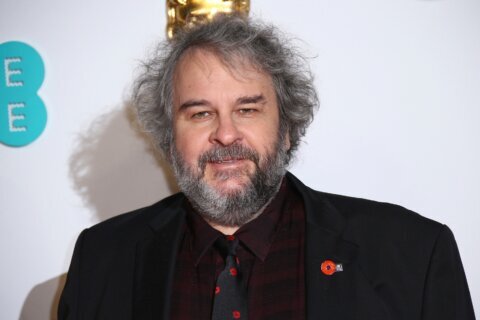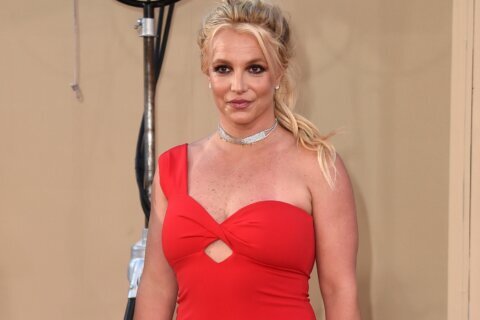This video is no longer available.
Hear our full chat on my podcast “Beyond the Fame with Jason Fraley.”
Hollywood too often suffers from the adage: “it’s not what you know, it’s who you know.”
So how do you break into the entertainment biz if you don’t have “nepo baby” connections?
Oscar nominee Terrence Howard and partner Mira Howard are launching the new talent discovery platform Holly to challenge decades-old Hollywood systems that favor industry insiders to unlock opportunities for creatives.
“We are constantly being asked by friends, by relatives, by talented people that we meet who are always asking, ‘How do I get into the business? How do I get a shot? How do I find a reputable agent? How do I audition? How do I find out about parts?'” he told WTOP. “If they could put their stuff on tape and record themselves and upload it to a platform where everybody could come to, then doctors, lawyers, judges, anyone [could audition].”
Suddenly, Pak brainstormed an idea to democratize the audition process for the 21st century.
“Mira had this idea when we were doing ‘Empire,'” he said. “She wanted to do a show called ‘The Audition’ where every year we would have talented people from around the world put up their auditions, see how that went, and at the end of the year we’d allow them enter ‘Empire,’ to become a part of ‘Empire,’ so that’s how it started.”
Currently, actors and other artists are beholden to third parties in the industry, namely talent agencies.
“Why is it that these gatekeepers are still the same gatekeepers and you never get a shot?” he said. “If you have a dream, let me make it possible. If you’re in Botswana, here, put your video up, you can audition for this and now the people searching for talent have a centralized place to look. A casting agent isn’t just limited to the people within its area. A casting agent can now interview somebody from Jakarta, [Indonesia].”
The new platform isn’t just for actors but rather for all creatives looking to upload examples of their work to catch the eye of a producer. Holly will be free for artists to sign up, while industry insiders will pay a subscription.
“If you’re a photographer, a set designer, a director, a writer trying to get your scripts read … a screenwriter trying to get his stuff into the WGA, the talent agencies can’t even look at the script, they have to hit delete right away or the person could say, ‘You stole my idea,’ so they never have a chance,” he said. “[With Holly] actors can pull scripts and have a table read. We can virtually build an entire production, then go out and say, ‘Let’s fund it.'”
The interface is still being designed but the vision is to create “LinkedIn meets Instagram.” The upstart venture is still in the investment phase, estimating six months to build the platform and another six months to market it.
“We’re hoping that with this technology we’ll be able to build that algorithm so we can know who the next rising star is,” she said. “We set up a crowdfund instead of going the traditional route because we wanted everyone to be a part of it. We’re probably about a year or so away from the tech being fully functional, which we’re pretty excited about. So watch out for it and know that we’re here and we can’t wait to have it fully running at 100% shortly.”
They hope that the digital platform will also help rising talents escape the dangers of Hollywood predators.
“If you’re in Oklahoma City, you don’t have to worry about your daughter pursuing her dreams as an actress,” he said. “You know that she’s safe and doesn’t end up in some skin flick. … Your children don’t have to go through the wolves or the dangers of Hollywood. There’s so many false auditions set up to trap people. This is a space where a community can look after you and you know the people you’re auditioning for are verified.”
Howard wished he had such a platform when he broke into the business in “The Jacksons: An American Dream” (1992) and “Mr. Holland’s Opus” (1995) before his standout role at the poker table in “The Best Man” (1999).
“The producers all kept coming up to me in that first ‘Best Man’ at the card table because here we’ve got this eight-minute or 10-page card scene,” he said. “They kept saying, ‘You’ve gotta say it like it’s a joke,’ and I’m like, ‘No, he’s dead serious about what he’s saying.’ … All of this goes along to where they’re saying that I’m holding back and being difficult, but then the movie comes out and all of these producers said, ‘You made the movie!'”
In 2005, Howard earned an Oscar nomination for Best Actor as a pimp-turned-rapper in “Hustle & Flow,” the same year that his other film “Crash” won Best Picture, playing a TV director fed up with racial profiling by the LAPD.
“I heard it was a political thing; they thought that if they had nominated me for both then it would split the vote and some people would vote for me for supporting,” he said. “They thought Matt Dillon had a really good shot, he’s done this business for so long and he was incredible in that film. I remember looking into his eyes when he was searching up my wife and thinking, ‘Is he f*ckin’ for real? He doesn’t look like he’s acting right now.'”
Arguably his greatest film remains Denis Villeneuve’s child-abduction thriller “Prisoners” (2013), co-starring Hugh Jackman, Maria Bello, Viola Davis, Jake Gyllenhaal, Melissa Leo and Paul Dano in an instant genre classic.
“That was so scary,” he said. “Again, I had another one of those moments where I’m looking into the eyes of an actor and Hugh, when he was enraged in that bathroom, I was afraid of him. I was afraid of him! I had never seen that pain in somebody, that desperate pain, and I don’t know where he drew that from, but the director and the cinematographer was, oh my God, that was the thing. … Paul Dano he just skyrocketed. I was so proud of him.”
On television, his most famous role remains hip-hop mogul Lucious Lyon in Fox’s “Empire” (2015-2020).
“‘Empire’ is what led us to build Holly,” he said. “The struggles that we had to go through in order to keep that a strong script, every week the stuff they were asking us to do inside the script, I just couldn’t do. I was like, ‘No.’ … ‘Empire’ had 24 or 28 million viewers in the second season and they allowed it to drop down to like four or five million viewers. … We could have had the success of ‘Billions’ or ‘Succession,’ who took that idea and did it right.”
Hear our full chat on my podcast “Beyond the Fame with Jason Fraley.”








